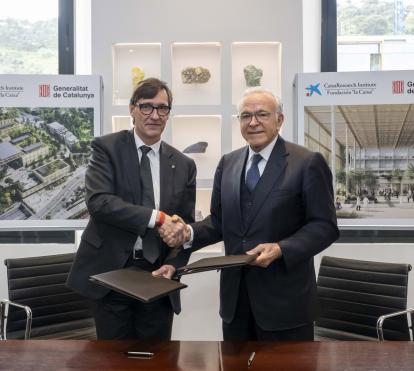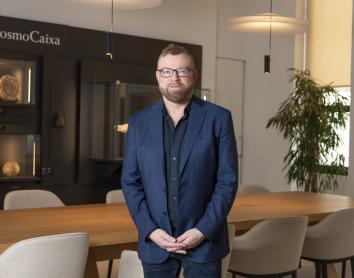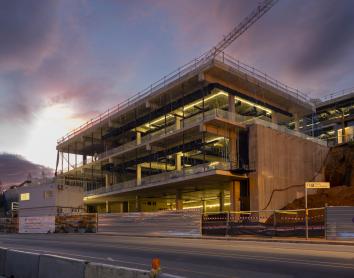
The Government of Catalonia and the CaixaResearch Institute join forces to promote the research ecosystem
16.04.25
5 minutes readThe president of the Government of Catalonia, Salvador Illa, and the chairman of the ”la Caixa” Foundation and chair of the Board of Trustees of the CaixaResearch Institute, Isidro Fainé, have signed a collaboration agreement between the two institutions to promote synergies and cooperation between the future CaixaResearch Institute and the knowledge infrastructures of the Catalan research ecosystem under the Department of Health and the Department of Research and Universities.
Both institutions will join forces to identify, develop and implement specific actions across various areas to drive collaborative research and innovation projects. This partnership aims to strengthen the Catalan health research ecosystem and achieve a greater social impact.
The CaixaResearch Institute, currently in development by the ”la Caixa” Foundation opposite the CosmoCaixa Science Museum, is scheduled to open in late 2025. Its objective is to advance the understanding of the immune system’s processes and their interaction with prevalent diseases, including infectious diseases, cancer and neurological disorders, among others, and its role in global health issues.
The mission of the Institute, which aims to become an international benchmark in the field of immunology, aligns with the commitment of the Catalan government, the Generalitat, to establishing Catalonia as a leading international hub for research. At the CaixaResearch Institute, this enhancement of research and innovation will be achieved through the talent of top professionals and with high-level technological equipment and state-of-the-art computational facilities.
The President of the Government of Catalonia, Salvador Illa, has stated that “the Government’s commitment to science is unwavering. We are deploying all our resources and alliances to enable Catalonia to realise its full economic and innovation potential. The time to act is now. And our challenge is clear: to position ourselves among the 50 most innovative regions in Europe. This agreement represents a significant step forward and is the best example of how we do things: enhancing public-private collaboration to improve citizens’ lives. ”
The President of the Government of Catalonia, has added that “in a world experiencing turbulent times, where some governments, such as the Trump administration in the United States, are turning their backs on or even attacking science, Catalonia says yes to science, says yes to technology and says yes to innovation in the service of the common good. This agreement was reached in the context of the Respondemos Plan and the Catalonia Talent Bridge programme, aimed at protecting our productive fabric and attracting scientific talent today to advance Catalonia’s future tomorrow.”
“With this agreement, the impact of the new CaixaResearch Institute is amplified thanks to the combined efforts with the Generalitat de Catalunya. More importantly, this will generate new knowledge and contribute to research aimed at improving citizens’ health. Once again, we are committed to public-private collaboration for the benefit of society as a whole, with the goal of building a better future for everyone,” explains Isidre Fainé, chairman of the ”la Caixa” Foundation and of the Board of Trustees of the CaixaResearch Institute.
The CaixaResearch Institute, in which building the ”la Caixa” Foundation will invest some 100 million euros, is poised to become a key player in the Iberian ecosystem in this field. This sector is among the most developed in Catalonia and has a significant economic impact. The Institute will be situated within a highly competitive environment, comprising prestigious research centres and universities, a robust healthcare infrastructure recognised globally and a strong biotechnology and pharmaceutical ecosystem. This strategic positioning will enable the Institute to establish strategic collaborations to enhance its research outcomes.
Three pillars: talent, innovation and cutting-edge technologies
Scientific excellence and the generation of new knowledge in disease immunology are one of the foundations of the future CaixaResearch Institute, which is why the Institute is actively seeking top professionals. A few months ago, the formation of its first research groups was announced, led by Dr Josep Dalmau, a pioneer in the identification of several autoimmune encephalitis syndromes, and Dr Gabriel Rabinovich, discoverer of new mechanisms of tumour escape and regulation of the inflammatory response.
Also involved are the oncologist Josep Tabernero, director of the Vall d'Hebron Institute of Oncology (VHIO), who chairs the internal Scientific Committee, and Antoni Ribas, director of the Parker Institute for Cancer Immunotherapy centre and the Tumor Immunology Program at the Jonsson Comprehensive Cancer Center, University of California, Los Angeles (UCLA), now also president of the Scientific Advisory Board of the CaixaResearch Institute. In addition to being chair of the ”la Caixa” Foundation's scientific committee, Javier Solana is also a member of the Board of Trustees of the CaixaResearch Institute.
Throughout 2025, the CaixaResearch Institute plans to announce the addition of new principal investigators. The Institute aims to establish 12 research groups by the end of 2027 and, when operating at full capacity in 2033, will host more than 40 research groups and scientific-technical service units, employing approximately 500 staff members.
Another key focus of the future Institute will be innovation and the transfer of knowledge into new health treatments and products. To achieve this, various strategies will be implemented to foster entrepreneurial spirit among researchers and to strengthen the Institute’s connections with the industry. This approach aims to facilitate the exchange of ideas geared towards valorising and commercialising research outcomes.
To support these objectives, the facility under construction at the base of the Collserola mountain range will encompass approximately 20,000 m². It will feature state-of-the-art installations for scientific activities, including wet and dry laboratories, scientific and technical services and dedicated areas for innovation.


